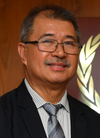1723 Sanaman general election: Difference between revisions
No edit summary |
No edit summary |
||
| (4 intermediate revisions by the same user not shown) | |||
| Line 7: | Line 7: | ||
| previous_election = 1719 Sanaman general elections | | previous_election = 1719 Sanaman general elections | ||
| previous_year = 1719 | | previous_year = 1719 | ||
| next_election = 1727 Sanaman general | | next_election = 1727 Sanaman general election | ||
| next_year = 1727 | | next_year = 1727 | ||
| seats_for_election = All 483 seats of the House of People's Delegates <br> '''242 seats''' needed for a majority | | seats_for_election = All 483 seats of the House of People's Delegates <br> '''242 seats''' needed for a majority | ||
| Line 15: | Line 15: | ||
| image1 = [[File:Toti Lampa.png|100px]] | | image1 = [[File:Toti Lampa.png|100px]] | ||
| leader1 = [[Toti Lampa]] | | leader1 = [[Toti Lampa]] | ||
| party1 = | | party1 = Workers' Revolutionary Front | ||
| alliance1 = United Revolutionary Front | | alliance1 = United Revolutionary Front | ||
| leaders_seat1 = | | leaders_seat1 = | ||
| Line 27: | Line 27: | ||
| image2 = [[File:Darius Hosseini.png|100px]] | | image2 = [[File:Darius Hosseini.png|100px]] | ||
| leader2 = [[Darius Hosseini]] | | leader2 = [[Darius Hosseini]] | ||
| party2 = | | party2 = Party of Democratic Humanism | ||
| leaders_seat2 = | | leaders_seat2 = | ||
| last_election2 = ''New'' | | last_election2 = ''New'' | ||
| Line 467: | Line 467: | ||
--> | --> | ||
== Results == | == Results == | ||
Rampant corruption, a lethargic government, a stagnant economy and growing unemployment contributed to a victory for the recently-formed [[Workers' Revolutionary Front]]. Even though polling ahead of the election had shown the WRF and the [[Party of Democratic Humanism]] in front, the WRF winning a majority in their own right came as a shock to the political system. Further, the massive reduction in support for the National Alliance and the complete collapse of the [[Sanamati Democratic Party]] were also surprise results. On 15.XII.1723, only three days after the opening of the new parliament, President [[Sino Lanto Yali]] appointed Toti Lampa Qukalsim. Following the election, the Party of Democratic Humanism [[1723-1724 Sanaman election protests|staged several large-scale protests]] in Niyi, Fatehpur Sikri, Semisa City and various other cities across the country. Following the appointment of the new government, renewed protests were staged, claiming election fraud and calling for new elections. Qukalsim Lampa denied the allegations, claiming them to be nonsensical since the Workers' Revolutionary Front was a newly formed party completely outside state governance. He also vowed to restore order and public safety and lambasted PDH leader Darius Hosseini for orchestrating violence against the new government. | |||
<!-- | <!-- | ||
The Tiegang Papers contributed massively to the landslide victory for the National Alliance and a historic 25 percentage point drop in support for the Sanamati Democratic Party. Lingering doubts about the Communities Movement caused many SDP voters to instead favour the center-right and liberal Agrarian League. In urban areas, SDP voters slightly preferred the CM over the Sanaman People's Party. With parties increasingly moving towards the center, and with corruption and nepotism being an increasing problem, many scholars believe that Sanaman politics will become more personality-driven and lesss governed by strong ideologies. With the collapse of a 12 year government party, the 1719 elections will likely bring in a period of increased political volatility as the new National Alliance government seeks to rebuild Sanama's international image. | The Tiegang Papers contributed massively to the landslide victory for the National Alliance and a historic 25 percentage point drop in support for the Sanamati Democratic Party. Lingering doubts about the Communities Movement caused many SDP voters to instead favour the center-right and liberal Agrarian League. In urban areas, SDP voters slightly preferred the CM over the Sanaman People's Party. With parties increasingly moving towards the center, and with corruption and nepotism being an increasing problem, many scholars believe that Sanaman politics will become more personality-driven and lesss governed by strong ideologies. With the collapse of a 12 year government party, the 1719 elections will likely bring in a period of increased political volatility as the new National Alliance government seeks to rebuild Sanama's international image. | ||
Latest revision as of 19:16, 20 January 2024
| ||||||||||||||||||||||||||||||||||||||||||||||||||||||||||||||||||||||||||||||||||||||||||||||||||||||||||||||||||
All 483 seats of the House of People's Delegates 242 seats needed for a majority | ||||||||||||||||||||||||||||||||||||||||||||||||||||||||||||||||||||||||||||||||||||||||||||||||||||||||||||||||||
|---|---|---|---|---|---|---|---|---|---|---|---|---|---|---|---|---|---|---|---|---|---|---|---|---|---|---|---|---|---|---|---|---|---|---|---|---|---|---|---|---|---|---|---|---|---|---|---|---|---|---|---|---|---|---|---|---|---|---|---|---|---|---|---|---|---|---|---|---|---|---|---|---|---|---|---|---|---|---|---|---|---|---|---|---|---|---|---|---|---|---|---|---|---|---|---|---|---|---|---|---|---|---|---|---|---|---|---|---|---|---|---|---|---|---|
| Turnout | 77,612,212 (88.73%) | |||||||||||||||||||||||||||||||||||||||||||||||||||||||||||||||||||||||||||||||||||||||||||||||||||||||||||||||||
|
| ||||||||||||||||||||||||||||||||||||||||||||||||||||||||||||||||||||||||||||||||||||||||||||||||||||||||||||||||||
|
File:SNM 1723 elections.png | ||||||||||||||||||||||||||||||||||||||||||||||||||||||||||||||||||||||||||||||||||||||||||||||||||||||||||||||||||
| ||||||||||||||||||||||||||||||||||||||||||||||||||||||||||||||||||||||||||||||||||||||||||||||||||||||||||||||||||
The 1723 Sanaman general election was held on 12.X and was the fourth elections following the 1707 change of political system. The sitting Qukalsim Kito Paliso was seeking a second term, with Toti Lampa of the United Revolutionary Front and Darius Hosseini of the Party of Democratic Humanism his main competitors. Following the victory of the National Alliance in the 1719 elections, expectations were high for the new government. However, rampant and growing corruption all across the national government, paired with infighting within the alliance and tensions between both Qukalsim Paliso and Talo Kalani and their respective parties, resulted in four years of ineffective government. This combined with a sluggish economy caused the approval ratings for the new government to plummet. However, commanding comfortable majorities in all three houses of the Lhusan Nasyonal, the government was safe from attempts to depose it. Elections were also held to the assemblies of the people's republics, as well as local and regional assemblies.
Participating parties
List of participating parties
Constituencies per people's republics
House of People's Delegates elections
Seat results
House of Councillors elections
Seats per sector
Estimated party breakdown
Council of People's Republics delegations
Seats controlled
Results
Rampant corruption, a lethargic government, a stagnant economy and growing unemployment contributed to a victory for the recently-formed Workers' Revolutionary Front. Even though polling ahead of the election had shown the WRF and the Party of Democratic Humanism in front, the WRF winning a majority in their own right came as a shock to the political system. Further, the massive reduction in support for the National Alliance and the complete collapse of the Sanamati Democratic Party were also surprise results. On 15.XII.1723, only three days after the opening of the new parliament, President Sino Lanto Yali appointed Toti Lampa Qukalsim. Following the election, the Party of Democratic Humanism staged several large-scale protests in Niyi, Fatehpur Sikri, Semisa City and various other cities across the country. Following the appointment of the new government, renewed protests were staged, claiming election fraud and calling for new elections. Qukalsim Lampa denied the allegations, claiming them to be nonsensical since the Workers' Revolutionary Front was a newly formed party completely outside state governance. He also vowed to restore order and public safety and lambasted PDH leader Darius Hosseini for orchestrating violence against the new government.




